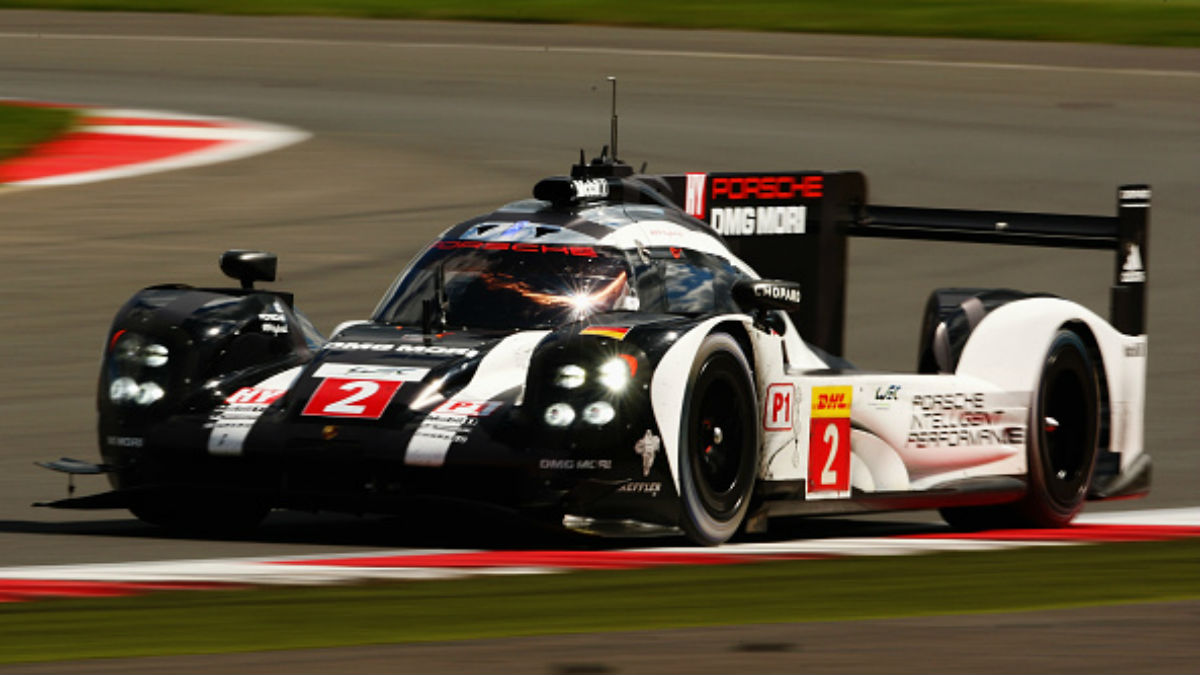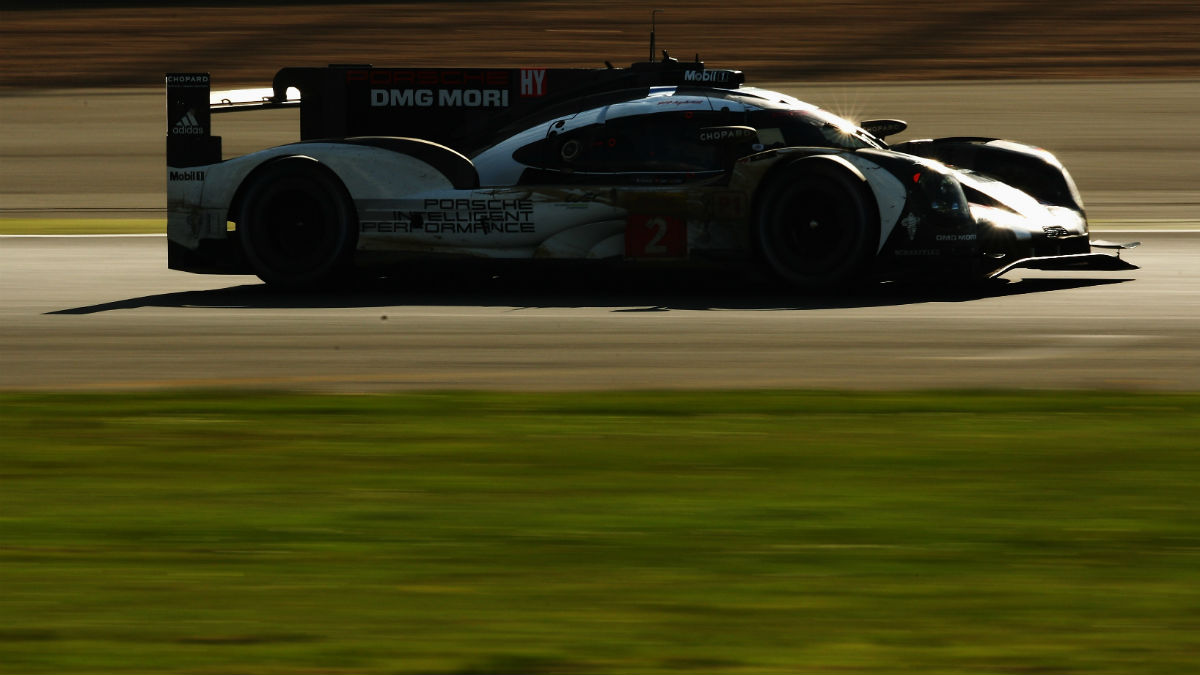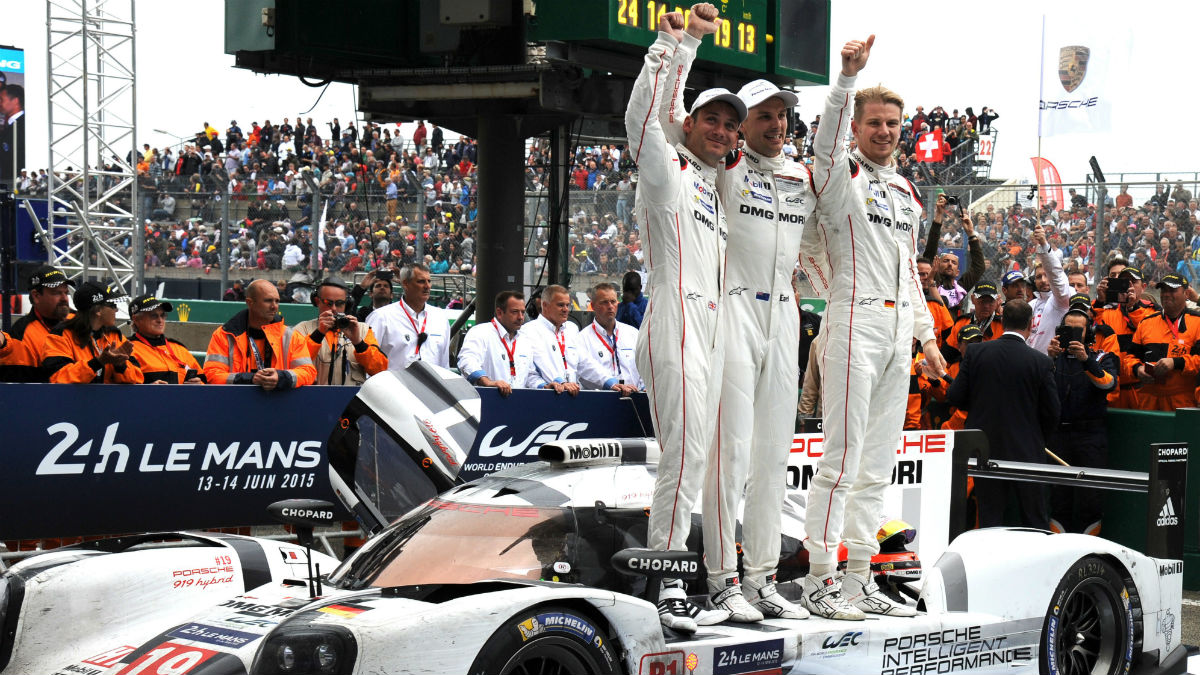From racetrack to road – the Le Mans technology driving the future
Technology heading the way of your road car will be on show at Le Mans, as Porsche defends its 2015 honours

A free daily email with the biggest news stories of the day – and the best features from TheWeek.com
You are now subscribed
Your newsletter sign-up was successful
The 84th running of the Le Mans 24h will see some of the fastest racing cars on the planet do battle across the span of an entire day, in a feat of endurance dominated by skill and bravery – and also technology.
Endurance racing is ruthless, and Le Mans specifically so. Cars must lap the Circuit de la Sarthe for 24 hours non-stop, and last year's winners – the number 19 Porsche 919 Hybrid driven by Formula 1 star Nico Hulkenberg, Nick Tandy, and Earl Bamber – managed to cover 395 laps of the 8.469 mile circuit for a total race distance of over 3,300 miles – equivalent to driving from London to Edinburgh and back four times.
Driving such long distances, at such speeds, for so many hours requires not just the fastest driver and car combination possible, but plenty of innovative thinking – new technologies to make the journey easier and faster. Historically, Le Mans has been a crucible of new automotive tech due to the insatiable demands of the racetrack, from small everyday additions you may take for granted during a commute, to the powertrains that could drive road cars in the future.
The Week
Escape your echo chamber. Get the facts behind the news, plus analysis from multiple perspectives.

Sign up for The Week's Free Newsletters
From our morning news briefing to a weekly Good News Newsletter, get the best of The Week delivered directly to your inbox.
From our morning news briefing to a weekly Good News Newsletter, get the best of The Week delivered directly to your inbox.

How Le Mans drives technology
The development of windscreen wipers is often attributed to Le Mans. Many early 20th century patents outlining systems for wiping windscreens exist, though the demands of 24 hours of high-speed running, combined with the possibility of changing weather conditions, have led many to believe their widespread adoption on the cars we drive today has been triggered by motorsport.
Disc brakes have a place in Le Mans history too. As lap times and top speeds began to creep up in the post-war era, the need for more reliable, better ways of slowing cars down did too. The technology arrived on the Le Mans scene in 1953, and became a motorsport necessity over the coming years, before heading to your road car.
Endurance racing – and Le Mans specifically – tends to have freer technical regulations compared to the rigid structure of Formula 1. While F1 teams chase loopholes and work within a tight framework, Le Mans almost encourages teams to try different approaches to finishing the 24 hour race. Arguably, nothing encompasses this more than the Garage 56 grid slot – an experimental, hands-off entry reserved for highly innovative cars.
A free daily email with the biggest news stories of the day – and the best features from TheWeek.com
The extra grid slot was introduced in 2012, and the semi-relaxed approach Le Mans organisers take towards the car that occupies it comes with a strict focus on developing new technology on the racetrack, over simply allowing whichever team is granted the slot to build the fastest car they can. No team was selected for Garage 56 honours in 2015, though previous efforts have showcased new powertrain technologies, as well as outside the box approaches to racing car design.
While this focus on developing new technologies now has a central hub in the form of Garage 56, the LMP1 cars leading the field highlight more race-ready, practical tech that could trickle down into road cars much sooner. Indeed, some already has.
Porsche at Le Mans
This year, Porsche will be hoping to secure its 18th outright victory at Le Mans. The German marque is the most successful in Le Mans history, its 17 overall wins not bettered by any other, despite a long hiatus from officially entering a car into the field leading Le Mans Prototype category between 1999 and 2013. When Porsche did arrive back on the scene in 2014, it only took another year to find the top step of the podium.
Right from their re-entry into the field leading LMP1 category, Porsche has placed technology linking its racing efforts to its road cars at the heart of its racing programme. The Porsche 919 Hybrid the company has used in its last two campaigns, is a rolling laboratory for proving innovative technology in the hardest endurance test of all.
High-powered, battery-assisted racing powertrains are now popular choices at the front of the Le Mans grid, and plug-in hybrid power has a presence in the firm's road car line-up in the form of the Panamera S E-Hybrid and Cayenne S E-hybrid. The company's flagship 918 Spyder hypercar, though no longer being made, uses hybrid technology too.
In the 919 Hybrid, a turbocharged 2.0-litre V4 engine drives the rear wheels, while innovative battery technology drives the front axle when called for by the driver, turning the car from a rear wheel drive, petrol powered racer, to a four wheel drive hybrid with significantly more power.
Energy recovery is key here, and the 919 Hybrid does it in two ways. Recuperating energy from hard braking events is mated to a secondary method, which makes use of exhaust gasses. A turbine is mounted in the exhaust tract, and it spins up as exhaust pressure builds – though variable geometry means that the turbine can adapt to engine revolutions, and it can be spun at lower engine revs too.
The spinning turbine generates charge, and is connected to an electrical generator. The electricity produced by these two systems is stored in an 800-volt lithium-ion battery pack, ready for the driver to call on for a massive power boost, taking total output to around 900bhp.
Technology that enables efficiency gains like this are vital to being competitive at Le Mans. It means using less fuel, which in turn reduces the number of pits stops needed to top up the car. Time spent re-fuelling is not time spent out on the racetrack, so minimising the need to come into the pits – regardless of the reason – is a core aspect of a successful endurance racing strategy.

What this means for road cars
Inevitably, these efficiency gains on track will trickle down onto the cars you can buy for the road. As already mentioned, Porsche already offers hybrid cars, but there's a second aspect of Porsche's Le Mans racer that links in with new developments in the firm's road car line-up. The turbocharged V4 engine used by the 919 is now mirrored by the use of downsized, but powerful turbocharged four-cylinder engines in the new 718 Boxster and 718 Cayman, producing more power, more torque, but delivering better MPG figures over the older cars.
As for the future, the battery technology being pioneered by Porsche for racing will find its way onto the road via a new halo model – previewed by the Concept Study Mission E.
The all-electric four door sports concept, with a 600bhp, 800-volt electric powertrain caused quite a stir when it was unveiled at the Frankfurt Motor Show last year, and it prefaces a car that will eventually make production – the first all-electric Porsche is on the way, and will be on sale by the end of the decade.
How you can watch
This year, the 2016 edition of the Le Mans 24h kicks off on Wednesday, 15 June with the first free practice session. The 24 hour race will begin on Saturday 18 June at 2pm UK time. Porsche Motorsport will enter two of its 919 Hybrids into the LMP1 category, gunning for overall victory, while two 911 RSRs will battle it out for LMGTE-Pro honours. There's more Porsche representation though – four privateer teams have chosen to run 911 RSRs this year.
To follow the Porsche team at Le Mans, Porsche has developed a dedicated microsite. Live feeds from the cars, along with information and live timing, will be available at www.porsche.com/lemans throughout the 24 hours. While keeping tabs on the whole race may only be for the most committed fans, it's certainly worth dipping into, as no other contest quite serves up the same high speed, high tech thrills.